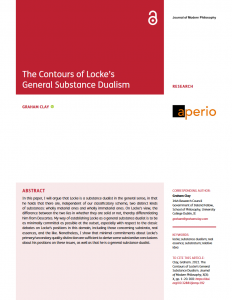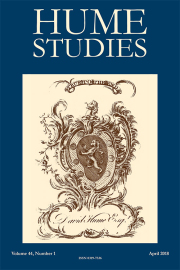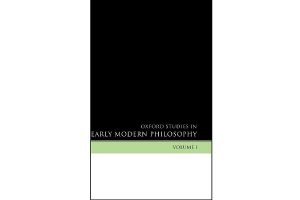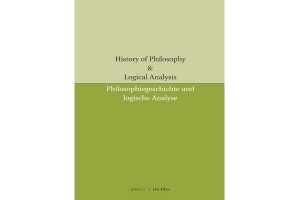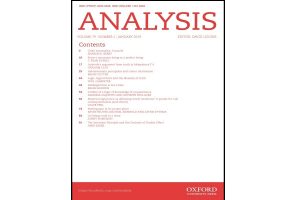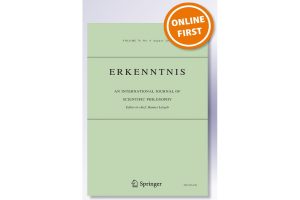Edited Journal Issues
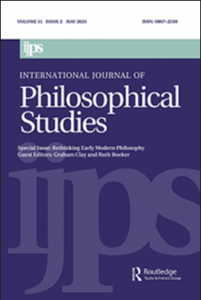
1. Rethinking Early Modern Philosophy
International Journal of Philosophical Studies, 31 (2): 105-265, 2023.
Co-edited with Ruth Boeker.
Peer-Reviewed Articles
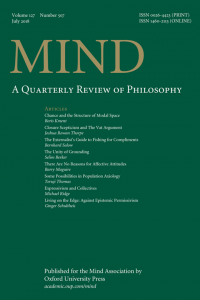
8. Hume’s Separability Principle, his Dictum, and their Implications
Mind, forthcoming.
Hsueh M. Qu has recently argued that Hume’s famed “Separability Principle” from the Treatise entangles him in a contradiction. Qu offers a modified principle as a solution but also argues that the mature Hume would not have needed to avail himself of it, given that Hume’s arguments in the first Enquiry do not depend on this principle in any form. To the contrary, I show that arguments in the first Enquiry depend on this principle, but I agree with Qu that Qu’s solution to Hume’s quandary frees him of the contradiction. Next, I compare Qu’s solution to Hume’s original position. By analyzing the divergent forms of Hume’s “Dictum” that follow from them, I show that Qu’s solution and Hume’s original position have significantly different consequences in a range of domains, including Hume’s modality. Generally, Qu’s solution fits better with Hume’s other commitments—even though Hume often fails to recognize it—thereby increasing its plausibility.
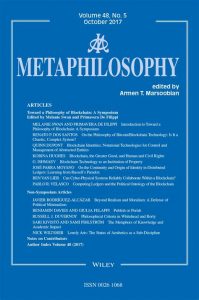
7. Philosophers Ought to Develop, Theorize About, and Use Philosophically Relevant AI
Metaphilosophy, 54 (4): 463-479. 2023.
Co-authored with Caleb Ontiveros.
The transformative power of artificial intelligence (AI) is coming to philosophy—the only question is the degree to which philosophers will harness it. In this paper, we argue that the application of AI tools to philosophy could have an impact on the field comparable to the advent of writing, and that it is likely that philosophical progress will significantly increase as a consequence of AI. The role of philosophers in this story is not merely to use AI but also to help develop it and theorize about it. In fact, we argue that philosophers have a prima facie obligation to spend significant effort in doing so, at least insofar as they should spend effort philosophizing.
In this paper, I will argue that Locke is a substance dualist in the general sense, in that he holds that there are, independent of our classificatory schema, two distinct kinds of substances: wholly material ones and wholly immaterial ones. On Locke’s view, the difference between the two lies in whether they are solid or not, thereby differentiating him from Descartes. My way of establishing Locke as a general substance dualist is to be as minimally committal as possible at the outset, especially with respect to the classic debates on Locke’s positions in this domain, including those concerning substrata, real essences, and the like. Nonetheless, I show that minimal commitments about Locke’s primary/secondary quality distinction are sufficient to derive some substantive conclusions about his positions on these issues, as well as that he is a general substance dualist.
Commentators have rightly focused on the reasons why Hume maintains that the conclusions of skeptical arguments cannot be believed, as well as on the role these arguments play in Hume’s justification of his account of the mind. Nevertheless, Hume’s interpreters should take more seriously the question of whether Hume holds that these arguments are demonstrations. Only if the arguments are demonstrations do they have the requisite status to prove Hume’s point—and justify his confidence—about the nature of the mind’s belief-generating faculties. In this paper, I treat Hume’s argument against the primary/secondary quality distinction as my case study, and I argue that it is intended by Hume to be a demonstration of a special variety.
I argue that the Hume of the Treatise maintains an account of knowledge according to which (i) every instance of knowledge must be an immediately present perception (i.e., an impression or an idea); (ii) an object of this perception must be a token of a knowable relation; (iii) this token knowable relation must have parts of the instance of knowledge as relata (i.e., the same perception that has it as an object); and any perception that satisfies (i)-(iii) is an instance of knowledge. I then apply this account to the case of sense perception. I argue that Hume holds that relations of impressions can be intuited, are knowable, and are necessary. For Hume, these relations constitute sensory knowledge. While Hume is rightly labeled an empiricist for many reasons, a close inspection of his account of knowledge reveals yet another way in which he deserves the label.
We argue that prevailing definitions of Berkeley’s idealism fail to rule out a nearby Spinozist rival view that we call ‘mind-body identity panpsychism.’ Since Berkeley certainly does not agree with Spinoza on this issue, we call for more care in defining Berkeley’s view. After we propose our own definition of Berkeley’s idealism, we survey two Berkeleyan strategies to block the mind-body identity panpsychist and establish his idealism. We argue that Berkeley should follow Leibniz and further develop his account of the mind’s unity. Unity—not activity—is the best way for Berkeley to establish his view at the expense of his panpsychist competitors.
Some of Aristotle’s statements about the indemonstrability of the Principle of Non-Contradiction (PNC) in Metaphysics Γ 4 merit more attention. The consensus seems to be that Aristotle provides two arguments against the demonstrability of the PNC, with one located in Γ 3 and the other found in the first paragraph of Γ 4. In this article, I argue that Aristotle also relies upon a third argument for the same conclusion: the argument from truth. Although Aristotle does not explicitly state this argument, it is the best argument that he could use to defend some of his statements in the second paragraph of Γ 4. Since the argument relies on only a few of Aristotle’s core views about truth, I propose that it is faithful to his considered position throughout his corpus, and it may be the strongest argument he could offer for the indemonstrability of the PNC.
There are some necessary conditions on causal relations that seem to be so trivial that they do not merit further inquiry. Many philosophers assume that the requirement that there could be no temporal gaps between causes and their effects is such a condition. Bertrand Russell disagrees. In this paper, an in-depth discussion of Russell’s argument against this necessary condition is the centerpiece of an analysis of what is at stake when one accepts or denies that there can be temporal gaps between causes and effects. It is argued that whether one accepts or denies this condition, one is implicated in taking on substantial and wide-ranging philosophical positions. Therefore, it is not a trivial necessary condition of causal relations and it merits further inquiry.
Invited Book Reviews

1. A New Scene of Thought: On Waldow’s Experience Embodied
International Journal of Philosophical Studies, 31 (2): 211-220, 2023.
In her book Experience Embodied, Anik Waldow challenges and reimagines the traditional interpretative approach to the concept of experience in the early modern period. Traditionally, commentators have emphasized early moderns’ views on the first-person perspective and eschewed the relevance of our embodiment to their epistemological outlooks. My focus here is on Waldow’s chapter on Hume, wherein she analyzes Hume’s account of our capacity for reflective moral judgment, arguing that he understands it as natural despite the countless ways in which our embodied social experiences impinge on it. After detailing Waldow’s contributions, I clarify, corroborate, and criticize them. Since I contend that Waldow is broadly successful in her interpretative efforts, I suggest that she undermines the traditional interpretative approach to experience in the early modern period, but not in the sense that she moves us away from the epistemological towards other lenses. Rather, Waldow should be understood as showing that, at least in the case of Hume’s metaethics, the epistemological is embodied, is social, and is both cognitive and sentimental.

